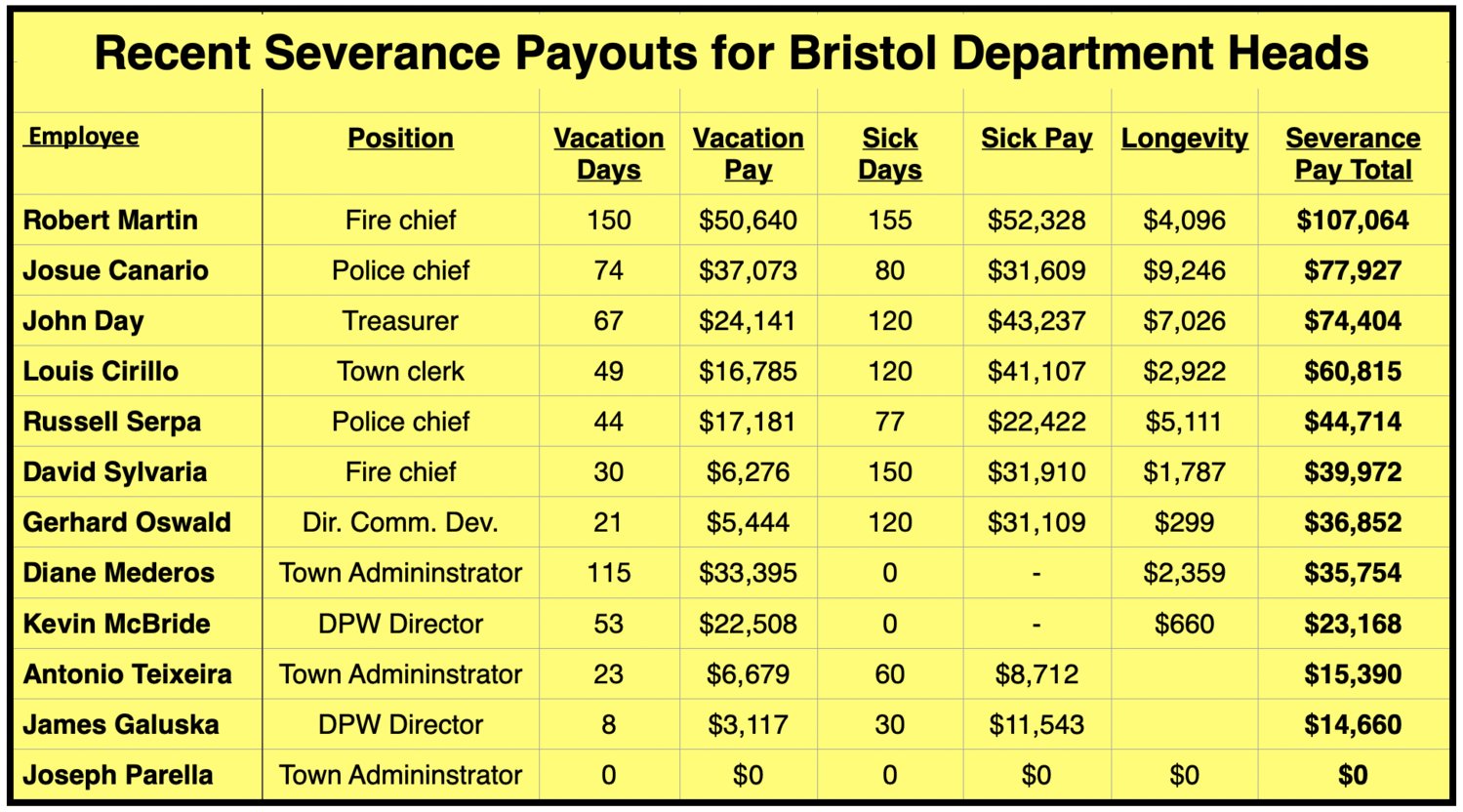- FRIDAY, APRIL 26, 2024
Bristol severances — a recent history of who got what
Some department heads got big retirement payouts and some did not; some elected leaders took big severances and some took nothing
Shown above are some of the severance payouts to retiring or departing Town of Bristol departments heads in the 21st century. A few things to note … Former Town Administrator Joseph Parella …
This item is available in full to subscribers.
Please log in to continue |
Register to post eventsIf you'd like to post an event to our calendar, you can create a free account by clicking here. Note that free accounts do not have access to our subscriber-only content. |
Day pass subscribers
Are you a day pass subscriber who needs to log in? Click here to continue.
Bristol severances — a recent history of who got what
Some department heads got big retirement payouts and some did not; some elected leaders took big severances and some took nothing
Like this story and want to help us do more?
The former fire chief retired with a severance check for more than $107,000. The former police chief left with almost $78,000.
One town administrator retired with a severance of almost $36,000. Another left with nothing, but that was his choice, reflective of his own personal philosophy.
The last town clerk left with nearly $61,000. The new town clerk says she won’t take any severance, whenever she leaves office.
Welcome to Bristol’s inconsistent, somewhat hidden world of municipal pay, benefits and severance packages — inconsistent in the past, that is. With new policies and newfound attention, they seem to be coming into sharper focus than they ever were before.
The eye-opener
Several things happened at the tail end of 2020 to bring compensation and benefits for the Bristol Town Clerk, as well as Town of Bristol severance packages, into the public spotlight.
In early December, retiring Clerk Louis Cirillo was poised to receive a severance check for nearly $61,000, at the same time that new Town Clerk Melissa Cordeiro was asking what she should be expecting for compensation and benefits in her new role.
The convergence — some might argue, divergence — of those two situations sparked questions, and confusion, both public and private. Bristol Town Council Chairman Nathan Calouro, now serving his sixth term in office, had never been made aware of a severance payment for an elected official. So he asked Town Solicitor Michael Ursillo for an opinion on the matter. That opinion landed on the council’s consent agenda — meaning they received the correspondence but would not typically talk about it in public.
Councilor Tim Sweeney also had never seen a severance payment for an elected official. So he pulled the legal opinion out of the consent agenda, triggering a tense public discussion between he and some of his colleagues in a live council meeting.
Mr. Cirillo was probably watching that meeting from home to see if he would be receiving his check for $60,815.11 anytime soon. Ms. Cordeiro was sitting with a front-row seat, recording minutes of the meeting but also watching to see how the contentious discussion might impact her future.
In a heated moment, Councilor Antonio “Tony” Teixeira, himself a former town administrator, told everyone that Mr. Cirillo’s severance was nothing unusual — you should see some of the severance payments from the past that had never made it into the public spotlight.
So the Phoenix took the thread that Mr. Teixeira left dangling and pulled it. Multiple requests for past financial records ultimately lifted the cover on a bureaucratic can of worms. Take a breath and settle in …The story of who gets what, when and why, is an intricate blend of policy, personality and personal philosophy, and the one thing difficult to find — at least in the past — is a true measure of consistency.
Salaries and benefits
Every two years, Bristol voters elect their five town councilors — volunteers who receive a small stipend for their many hours in meetings and in between — and two town employees — the administrator and the town clerk. The administrator’s compensation is somewhat defined in the Bristol Town Charter. The town’s governing document states the salary for the position (currently $95,500) but makes no mention of further benefits, like medical or dental coverage, vacation or sick time.
The clerk’s employment package is even less defined. Here’s what it says on the matter: “The town clerk and the deputy clerk shall receive such annual salaries as may be set by the council, and no other compensation for the performance of their official duties.”
That “no other compensation” part can seem vexing — for both the new clerk stepping into the role, and for some councilors, who were about to see a $60,815.11 severance check go out in the mail to the respected, admired and retiring town clerk.
Who’s in charge?
So who determined that Louis Cirillo was entitled to a payout of unused sick time (120 days), vacation time (49 days) and longevity pay, equal to nearly $61,000 for his 16 years in office? They did. Who? Them. Who? … Exactly.
“They” are all the town leaders who oversaw — or didn’t — past practice at 10 Court St. In the past 30 years, several elected leaders left office with less robust severance packages than Mr. Cirillo, but they were all based on the same premise: a payment for unused sick and vacation time, plus earned longevity pay.
One left with nothing — not because he used up all his time, but because he never felt it was part of the job he was elected to do.
Despite the lack of consistency, one thing is consistent. The town’s department heads, its leaders of Town Hall, police, fire, public works, etc., have almost always received benefits that mimicked what their unionized workers were getting.
When the union signed a contract allowing workers to accumulate 150 sick days, the manager did the same. When the union workers accumulated longevity pay as a bonus on top of their base salary, their bosses did the same.
The result was a system based mostly on past practices and unwritten precedents. Some department heads had their own employment contracts with language that specifically stated their benefits would mirror those within their respective union’s contract. Others worked without a contract, but with the premise that they would receive whatever benefits were outlined in the Town Hall workers’ contract, covering clerks, administrative assistants and others.
Severance payouts followed this “system,” with the bosses retiring under the same terms as their union workers, receiving large checks for unused sick time, vacation time and longevity pay.
Making benefits more standard
Some of the system has changed in recent years. Current Town Administrator Steven Contente is proud of the fact that he was the first chief executive to add an employee handbook to town government, something that had never existed before. The “Non-Union Employee Benefits Summary” spells out everything that these non-union bosses receive. Everything is clearly delineated, and in some areas the benefits are more restrictive than in the past. Included are:
- A schedule for Longevity Pay, topping out at 7.5% of an employee’s salary after they have worked for more than 15 years;
- Employee co-pays of 20% (the employee pays 20% of the premium) for Blue Cross medical coverage and Delta Dental dental coverage;
- A healthcare buyback of $2,500 for families or $1,250 for individuals who decline the coverages;
- Retiree health coverage for those with 20 years of service time;
- Enrollment in the state pension system;
- Vacation time ranging from 10 days (year one) to 25 days per year (after 20 years of service), with a two-year window of time to use it or lose it — in other words, the maximum amount of vacation time someone could accumulate is 50 days (this is new);
- 15 sick days per year, which can accumulate up to a maximum of 120 total days; for those hired after July 1, 2011, they receive only 50% of their unused sick time upon termination or retirement.
Compare those terms to some of the severance packages shown in the chart below. Former Fire Chief Robert Martin was paid for 150 vacation days and 155 sick days — triggering his severance check for $107,064.21. For an employee hired after 2011, they would be capped at 50 days and 60 days, respectively.
The fire chief before Mr. Martin, David Sylvaria, left with 150 unused sick days, the maximum allowable at the time. Others who “maxed out” their sick time were former Town Treasurer John Day, former Community Development Director
Gerhard Oswald and the former administrator, Mr. Teixeira. The latter cashed in 60 unused sick days after his four years in the administrator’s office, but he was paid at 50% of his full-time rate.
Are elected leaders different?
The severance package for Mr. Teixeira brings the narrative back to the topic of elected officials. Are they different than the town’s hired department heads? Yes and no. It depends on who you ask.
Practically speaking, some of these elected leaders follow the same terms as the hired department heads. Mr. Teixeira said that when he was elected to office in 2012, Town Treasurer Julie Goucher outlined for him the package of benefits that came with the office. From his perspective, it was standard operating procedure.
But it wasn’t always that way.
Eight years earlier, Joe Parella moved to private life after a decade in the town administrator’s office and took no severance. He certainly had unused sick time. “I don’t know if I ever called in sick,” he said. “Back in those days, before Covid,” he laughed, “you took a Dayquil and went to work.”
Mr. Parella just had a different philosophy about his role and what he was entitled to.
“As far as my time, I didn’t keep track of it,” Mr. Parella said. “My job was to come in when I needed to come in, to go to meetings when I needed to go to meetings, and there was nobody keeping track of that time other than me. I took a day off if I needed to take a day off.”
He added, “You answer to the people; you don’t answer to anyone else.” He believed that his performance reviews came every two years on Election Day.
Having said all that, Mr. Parella added that days off were rare. He said he took a couple weeks of vacation every year, especially once he got married, so he and his wife could get away. He didn’t feel he was entitled to anything more when he left the job.
“I didn’t feel, as an elected official, that I was entitled to a severance,” he said. “I don’t think you should get severance if you’re an elected official.”
He also takes a different view of sick time than most others in municipal service. “When I was on the school committee, I always had a problem with paying people for unused sick time,” he said. “I never could grasp the concept of paying people for unused sick leave.” But he knows it is a reality in every municipality and school district, and Bristol is not unlike every other city or town.
When did it change?
The bridge between Joe Parella and Tony Teixeira in that town administrator’s office was Diane Mederos — an interesting case. Ms. Mederos spent 20 years as Bristol’s elected town clerk, then won the chief executive’s seat when Mr. Parella left office.
When she retired eight years later, she had spent nearly three decades as an elected leader in Bristol Town Hall. She cashed in 115 unused vacation days, but she had no sick days, and she was paid a $35,754 severance. Ms. Mederos did not return a call for comment on this story.
The situation today
Town Administrator Steven Contente is obviously a close follower of the public discussion and scrutiny of severances. But he’s not directly involved. The charter makes it clear that the Town Council sets the Bristol town clerk’s compensation, not he.
As for his own situation, Mr. Contente’s views are very similar to predecessor Joe Parella’s — don’t expect a severance payment once he leaves.
“I don’t need the benefits, I don’t need the sick time, and I’m not looking for a severance,” said the retired Bristol police officer. He said he works for the people of Bristol, and he answers to them. The only one tracking his time or approving his days off — there aren’t many — is he himself. “I’m here as an elected official. I’m chosen by the voters. I get my salary, and that’s all I get,” he said.
Though he, like many Bristol voters, opposed the idea of re-naming his title “mayor,” he approaches his job like he’s a mayor. “I’m sure most mayors don’t track their time like that. They do the job, whatever it takes.”
As for his influence on this whole situation, Mr. Contente believes he’s helped make things better. There are only four union contracts in town — fewer than in the past — and only two individual contracts — one for the fire chief and one for the police chief, both of which are mandated by the town charter. Other than that, every other town employee is working under the same set of guidelines, as spelled out in his new employee handbook.
“It’s much easier to be consistent across the board,” he said, “so everyone knows what to expect, and people are not treated differently.”
Compensation for the clerk
Speaking of treating people differently, the matter comes full circle to the town clerk’s office. Why was Louis Cirillo given a severance payout that was not specifically delineated anywhere, and which might have been in conflict with the Bristol Town Charter?
Because that’s what others before him got.
Asked by Nathan Calouro to research the issue, the town’s attorney, Michael Ursillo, came back with a strong recommendation that the town pay Mr. Cirillo his full severance of unused sick and vacation time, for two reasons. First, there was ample past precedent to do so. The elected Diane Mederos got a severance. The elected Tony Teixeira got a severance.
Secondly, all of those town clerk benefits — longevity, severances, etc. — were included in the town’s annual budget. “Any changes to this past practice, if desired, should be made prospectively so that the individual sitting in that office is made aware of their compensation package upfront,” Mr. Ursillo wrote in his opinion.
He further suggested that any changes to this “past practice” be discussed and approved at a public meeting, with language specific to longevity pay, sick time, health insurance co-pays and other benefits.
That’s exactly what the council expects to do, sometime soon. Mr. Calouro said they plan to sit down with current Town Clerk Melissa Cordeiro to have a discussion about her terms of employment. For now, she is working with the same salary and benefits that Mr. Cirillo had upon leaving.
In a couple of interviews, Mr. Calouro has said that the new town clerk will obviously be receiving a competitive salary and health benefits. She is also automatically part of the state retirement system. He would like everything else to be subject to discussion, including things like the accumulation and accrual of paid time off.
Ms. Cordeiro can also see the situation from two perspectives. Until early December, she was a member of the union of workers she now supervises. She received the full slate of union benefits and was paid a severance, per contract, upon leaving for the clerk’s job in December.
The man asking questions
Councilor Tim Sweeney was the person most responsible for bringing this whole affair into the public spotlight, and he says he’s looking for transparency and consistency.
“I had never heard of a severance payout for an elected official,” he said in a followup interview after the meeting when councilors approved the Louis Cirillo severance payment. That was a 4-1 vote, with Mr. Sweeney the lone opponent — not out of any personal feelings toward the person. He was more concerned with the process for tracking, accruing and paying these large sums. He reiterated numerous times that he was just trying to do his due diligence on behalf of taxpayers.
“This isn’t about Lou. It’s about process,” Mr. Sweeney said. “I was being asked to rubber-stamp something. I’m not going to rubber-stamp anything. We have to change this process, prospectively, moving forward … With most decisions we make, we usually have a lot of documentation. All I had in this case was a memo from the town solicitor.”
As for “process,” Town Treasurer Julie Goucher said the town’s ADP Human Resources and payroll system is used to record and track vacation time, sick time and days worked. It was not in use when Louis Cirillo started working for the town, but it was there when he left. The previous records were imported into ADP, she said.
From her perspective, the payment of severances is a somewhat automated process. The HR system tells them how much paid time an employee has taken, and how much they have left, and the actual severance is pretty straightforward.
Except, with elected leaders, they don’t really answer to anyone for approval of their sicks days and vacation time. They answer to themselves — and the voters of Bristol.
Mr. Sweeney believes elected leaders should be treated differently than hired department heads. “As a duly elected official, you are not obligated to put in for sick time or any vacation time,” he said. “They can take as much time or as little time as they want.”
Yet Mr. Sweeney believes these people deserve and should take vacation time — rather than stockpiling months of it.
“For an elected official, we need to remove sick time and vacation time. Or we need a process where it’s use-it-or-lose-it,” Mr. Sweeney said. “Of course, I strongly believe that vacation is important to take, especially in this day and age. Vacation is there to recharge and come back more productive. The idea of not using vacation is not healthy.”
The new town clerk
So where does this leave the new clerk? Since the issue has yet to be addressed by the council, the town is continuing to pay Melissa Cordeiro the same as her predecessor. Mr. Calouro said a conversation is coming soon.
Asked for her thoughts on that upcoming conversation, and what her expectations were both running for office and getting sworn into the job, she emailed a statement: “When I ran for this office, I had no reason to think that the Town Council would change the benefit package that has been in place for decades. But, I was not aware that elected officials received any sort of severance payment upon leaving office.
“I will NOT take a severance payment upon leaving public office, however I fully expect to be treated fairly with the same compensation and benefit structure as my predecessors.”
Recent Severances for Bristol Department Heads
|
Employee |
Position |
Vacation Days |
Vacation Pay |
Sick Days |
Sick Pay |
Longevity |
Severance Pay Total |
|
Robert Martin |
Fire chief |
150 |
$50,640 |
155 |
$52,328 |
$4,096 |
$107,064 |
|
Josue Canario |
Police chief |
74 |
$37,073 |
80 |
$31,609 |
$9,246 |
$77,927 |
|
John Day |
Treasurer |
67 |
$24,141 |
120 |
$43,237 |
$7,026 |
$74,404 |
|
Louis Cirillo |
Town clerk |
49 |
$16,785 |
120 |
$41,107 |
$2,922 |
$60,815 |
|
Russell Serpa |
Police chief |
44 |
$17,181 |
77 |
$22,422 |
$5,111 |
$44,714 |
|
David Sylvaria |
Fire chief |
30 |
$6,276 |
150 |
$31,910 |
$1,787 |
$39,972 |
|
Gerhard Oswald |
Dir. Comm. Dev. |
21 |
$5,444 |
120 |
$31,109 |
$299 |
$36,852 |
|
Diane Mederos |
Town Admininstrator |
115 |
$33,395 |
0 |
- |
$2,359 |
$35,754 |
|
Kevin McBride |
DPW Director |
53 |
$22,508 |
0 |
- |
$660 |
$23,168 |
|
Antonio Teixeira |
Town Admininstrator |
23 |
$6,679 |
60 |
$8,712 |
$15,390 |
|
|
James Galuska |
DPW Director |
8 |
$3,117 |
30 |
$11,543 |
$14,660 |
|
|
Joseph Parella |
Town Admininstrator |
0 |
$0 |
0 |
$0 |
$0 |
$0 |
Other items that may interest you














